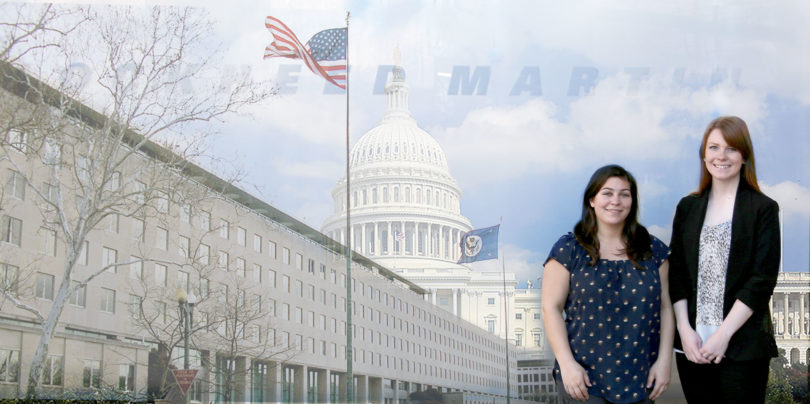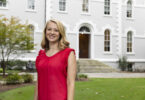What Sydney North and Amanda El-Kadi are learning this semester isn’t found within the walls of a classroom.
North, a third-year student from Carrollton double-majoring in journalism and political science, and El-Kadi, a fourth-year student from Alpharetta majoring in international affairs and Arabic, are two of 31 students participating in UGA’s Washington Semester Program this spring.
North is interning with the American Chemistry Council, and El-Kadi is interning with the Department of State in the Foreign Service Institute.
“It’s been a totally different learning experience from anything in Athens or Atlanta that I’ve had before,” North said. El-Kadi agreed, saying it is “an amazing opportunity.”
In addition to seeing the sometimes theoretical points of their classes put into practice, the students also are learning networking skills, often from the 80 Washington Semester Program alumni living in the District of Columbia.
“Networking is a really big thing we’re told about all the time,” El-Kadi said. “I’ve been using my time here to talk to all of these amazing people in the State Department who have done so much and gotten to go so many places. They have the job that I want, so learning from them is amazing.”
This internship also has helped North narrow down her career path after graduation, saying that she now knows she wants to focus on policy and legislation.
“I use the [lessons] I learned in my UGA classes now every single day in my internship,” North said. “It’s definitely helped my education because now I actually have to use what I’ve learned and remember what I’ve learned, and it’s applicable to me and my career. It’s hard when you are not actually working in it to see how it applies to your life and your job.”
North and El-Kadi added that money management and time management skills have become even more important while living in an expensive area and working a minimum of 40 hours per week.
“I think [these internships] prepare you more for real life,” El-Kadi said. “It makes you have a lot more responsibility than just sitting in class, and it’s teaching me a lot about what my actual day-to-day life may be like when I graduate in a couple of months.”
The Washington Semester Program started in January 2008, and more than 370 students have interned in the nation’s capital since then through the program, according to director Don DeMaria.
Sophomores with a GPA of 3.0 or higher may apply and then go through an interview process. DeMaria works with students during this process to find the right internship for them.
“We want to provide opportunities where students can apply their learning outside of the university and demonstrate the quality of the classroom instruction within the workplace,” DeMaria said.
Students in the program are required to take two classes, or six hours of classwork, in addition to their internship. The first is a seminar, and students choose between one of two other classes.
Classes are held at Delta Hall, UGA’s privately funded $12 million residential learning community. The building houses up to 32 students and has two classrooms, a kitchen, dining area and several common areas. It opened in January 2015 and also hosts Honors in Washington, Congressional Agricultural Fellows, Grady@DC, and other programs and events.
Delta Hall’s close proximity to Capitol Hill makes it a convenient location for students interning in congressional offices and for members of Congress visiting the facility to speak to students.
“Now we have this place that I think is uniquely the university. It puts our institution at a level in Washington, D.C., that is very different than most other institutions,” DeMaria said. “It enables us, as a program, to do a lot more than what we could in the past. Now, we can not only meet as a class, but we can have lunches, and we can invite other institutions and their students to come join us and put together a panel.”
In fact, students from UGA and Ohio State’s John Glenn School of Public Affairs will team up for a public service panel at Delta Hall later this semester.
“The community that is built among the students because of the intentional design of the living area in particular is incredible,” DeMaria said. “Probably the biggest advantage that comes from this is the informal interactions that happen now because they share space.”
North and El-Kadi agreed.
“It’s nice to be in a house with people who are in the same boat as you,” North said. “If we didn’t have the big house and weren’t living together, I don’t think I would enjoy Washington, D.C., nearly as much. A big part of being up here for me is the people I’ve gotten to know in the house.”








